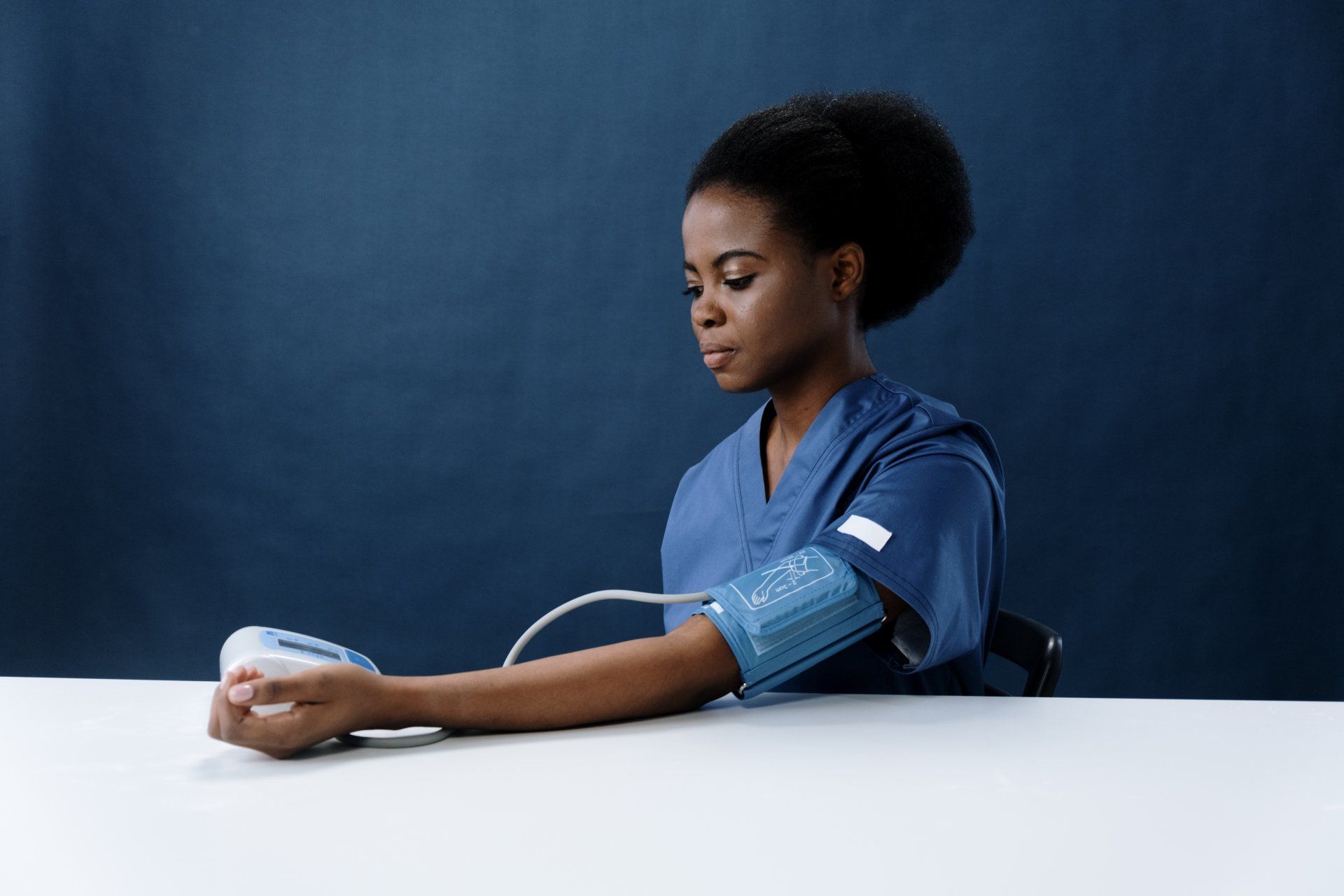BLOOD PRESSURE

Every visit to your doctor usually starts with checking your "vitals," or "vital signs."
What are these vital parameters?
They usually include your
- heart rate
- oxygen saturation (pulse ox)
- respiratory rate
- temperature
- blood pressure
Why is it important to know your blood pressure?
Why does the reading include two numbers?
What happens if the numbers are too high or too low?
Let's understand the basics of blood pressure monitoring and at-home care.
WHAT IS BLOOD PRESSURE?
We need oxygen to survive; every small cell needs it.
We inhale oxygen into our lungs, and our blood vessels take it from our lungs and carry it to each cell of our bodies.
The heart (or pump) ensures that oxygen reaches everywhere by squeezing the blood through the blood vessels. This squeeze naturally produces a current in these vessels called "blood pressure."
WHAT DO THE TWO NUMBERS MEAN?
Your heart contracts (or squeezes) to push blood through your vessels. Then it relaxes. This cycle continues all day, every day.
The first number (the systolic) in a blood pressure reading measures the pressure exerted on the blood vessels when your heart is contracting.
The second number (the diastolic) measures the pressure when your heart is relaxed.
UNDERSTANDING THE MEANING OF HIGH AND LOW BLOOD PRESSURE
If the heart needs to do more work to push blood through the blood vessels (like pumping water out from a narrow hose), the pressure in these vessels will be consistently higher than normal. This is called hypertension or high blood pressure.
If your heart cannot pump effectively, the pressure in your blood vessels will be lower than normal. This is called hypotension or low blood pressure.
From a clinical point of view, hypertension is more concerning, being on the list of WHOs global targets for risk reduction by 2030. 1
WHO CAN GET HYPERTENSION?
According to the American Heart Association, several medical conditions may increase your risk of developing hypertension, including
- diabetes
- obesity
- high salt diet
- smoking
- alcoholism
- high cholesterol 2
HEALTH IMPACTS OF HIGH BLOOD PRESSURE
Before discussing preventive measures, it is crucial to understand the effects of hypertension. You may not notice any symptoms of high blood pressure initially, so checking your blood pressure and keeping track of them is even more necessary.
High currents in the vessels thicken the walls over time, and the opening narrows, compromising the blood supply to organs and other tissues in the body.
Over time, the blood vessels weaken due to the stress on their walls, and cholesterol from the blood can easily stick to these weak walls.
These narrowed arteries can affect
- the kidneys, causing kidney failure
- the brain, causing a stroke
- the heart, causing chest pain or a heart attack
- the eyes, causing difficulty in seeing
- the sexual organs, causing sexual dysfunction 3
HOME MONITORING
Who should monitor their blood pressure at home, and how often should they do it?
Adults aged 18 to 40 with a family history of high blood pressure and those already on medication controlling their blood pressure can check yearly.
Individuals with uncontrolled hypertension and the elderly population might require more frequent checks. Ask your doctor how often you should check and record your blood pressure.
Home monitoring is not a substitute for visiting the physician's clinic. Do not reduce or stop your prescribed medications based on home monitoring readings. Always talk to your physician before making any changes to your medications.
What equipment do you need?
An automated blood pressure monitor with a cuff is all that is required.
How do you record your blood pressure?
- Sit on a chair with a table in front of you. Stay calm, so stress does not raise your blood pressure higher.
- Place your arm on the table with the palm facing up, so it is at the same level as your heart, and strap the cuff around it.
- Turn the power on. The cuff will inflate. This might be slightly uncomfortable.
- Make a note of the reading and turn the power off.
BLOOD PRESSURE CATEGORY
SYSTOLIC mm Hg (upper number)
and/or
DIASTOLIC mm Hg (lower number)
NORMAL
Systolic LESS THAN 120
and
Diastolic LESS THAN 80
ELEVATED
Systolic 120 – 129
and
Diastolic LESS THAN 80
HIGH BLOOD PRESSURE (HYPERTENSION) STAGE 1
Systolic 130 – 139
or
Diastolic 80 – 89
HIGH BLOOD PRESSURE (HYPERTENSION) STAGE 2
Systolic 140 OR HIGHER
or
Diastolic 90 OR HIGHER
HYPERTENSIVE CRISIS (consult your doctor immediately)
Systolic HIGHER THAN 180
and/or
Diastolic HIGHER THAN 120
Chart source: American Heart Association 4
Use a journal book or sample charts from the AHA to maintain a log for your physician.
Should I check the BP on the right or left arm?
Either arm is fine. According to AHA, a difference of less than 10mmHg systolic pressure on both arms is normal.
Why is my blood pressure lower at home?
Anticipatory stress can raise your blood pressure. This frequently happens in a doctor's office when you're waiting to see the doctor or receive test results. In fact, there's a name to this phenomenon- "white coat hypertension."
PREVENTING HYPERTENSION
Regardless of family history, studies have proven that maintaining a healthy lifestyle can significantly drop the risks of developing life-threatening hypertension.
Tailoring your lifestyle to improve cardiovascular function has proven benefits.
Exercise
Regular moderate physical activity can lower the BP reading by up to 8 mmHg.
Aerobic exercises help lower blood pressure. These can include
- walking
- swimming
- cycling
- running
A study conducted on treadmill use three times a week showed a drop in blood pressure in individuals with hypertension that was not responding well to medication.5
Additionally, resistance training also reduces the baseline blood pressure, and isometric handgrip training (IGHT) helps the most. 6
Consult with your doctor regarding which kind of exercise best suits you.
Along with exercise, your diet plays a big role in your heart's health and your blood pressure.
The DASH Diet
Short for Dietary Approach to Stop Hypertension, the DASH diet focuses on increasing potassium, calcium, and magnesium and reducing sodium in your diet with ingredients found easily in the local markets.
Sodium draws water into the blood vessels, contributing to high blood pressure.
Overall, the diet includes whole grains, fresh fruits, and vegetables.
Saturated fats, sugars, full-fat dairy, and fatty meats are only consumed in lower proportions. 7
You can find a thorough serving guide on DASH diet: Healthy eating to lower your blood pressure - Mayo Clinic. As you start cutting down on highly processed and low-sodium foods, it will take a few weeks for you to adjust to the new palate. Start slowly and steadily for better results.
REFERENCES:
- Hypertension [Internet]. [cited 2023 Mar 22]. Available from: https://www.who.int/news-room/fact-sheets/detail/hypertension.
- High blood pressure [Internet]. www.heart.org. [cited 2023 Mar 22]. Available from: https://www.heart.org/en/health-topics/high-blood-pressure
- Health threats from high blood pressure [Internet]. www.heart.org. [cited 2023 Mar 22]. Available from: https://www.heart.org/en/health-topics/high-blood-pressure/health-threats-from-high-blood-pressure.
- Monitoring your blood pressure at home [Internet]. www.heart.org. [cited 2023 Mar 22]. Available from: https://www.heart.org/en/health-topics/high-blood-pressure/understanding-blood-pressure-readings/monitoring-your-blood-pressure-at-home
- Dimeo F, Pagonas N, Seibert F, Arndt R, Zidek W, Westhoff TH. Aerobic exercise reduces blood pressure in resistant hypertension. Hypertension [Internet]. 2012 Sep [cited 2023 Mar 22];60(3):653–8. Available from: https://www.ahajournals.org/doi/10.1161/HYPERTENSIONAHA.112.197780
- Cornelissen VA, Fagard RH, Coeckelberghs E, Vanhees L. Impact of resistance training on blood pressure and other cardiovascular risk factors: a meta-analysis of randomized, controlled trials. Hypertension [Internet]. 2011 Nov [cited 2023 Mar 22];58(5):950–8. Available from: https://www.ahajournals.org/doi/10.1161/HYPERTENSIONAHA.111.177071
- Managing blood pressure with a heart-healthy diet [Internet]. www.heart.org. [cited 2023 Mar 22]. Available from: https://www.heart.org/en/health-topics/high-blood-pressure/changes-you-can-make-to-manage-high-blood-pressure/managing-blood-pressure-with-a-heart-healthy-diet
Thank you for reading Patient Education Essentials, the Write Shift RN blog.
Disclaimer: This article was written as a guest post for Write Shift RN LLC's blog. The information in it may not be wholly fact-checked or edited, allowing the reader to see the writer's work and skills firsthand. This information is not intended as medical advice. It is for informational and educational purposes only. Always talk to your doctor or other qualified healthcare providers about any questions or concerns you may have regarding medical conditions.











